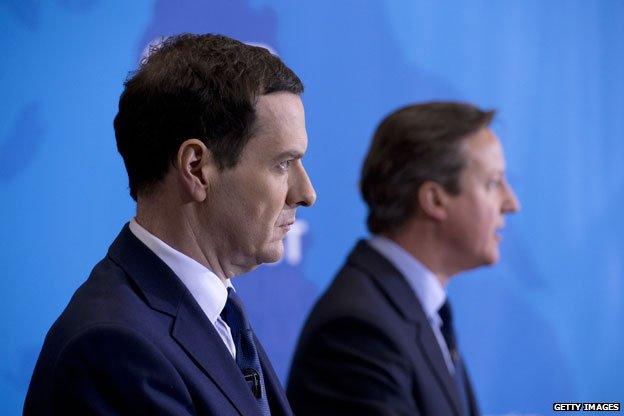Should Tories put the chancellor in straitjacket?
- Published
- comments

In most British people's minds, the Great Crash and Recession of 2008 probably feels like yesterday - the defining economic shock of our age, we continue to live with its noxious effects.
But the Tories and Labour are today behaving as if the risk of another such shock in the current parliament is nil, because in different ways they've both limited their room to offset the impact of one.
And history would teach us that the economy tends to go pop when we least expect it.
So what have they announced?
Well the Tories have said they would legislate within 100 days of forming a government to make it illegal for a Chancellor during the life of the next parliament to raise income tax rates, VAT or National Insurance.
There are a couple of things to say about this.
First some will see it as a blatant admission that what politicians say, in their manifestos and elsewhere during an election campaign, isn't to be trusted.
If we need a new law to convince us Tories won't put up taxes, that implies everything else they've promised during the election campaign is in the category of good intentions, which could be abandoned the moment the going gets tough.
Which is hardly likely to reinforce our confidence in the political class.
David Cameron would probably say he's prepared to take that risk, because he wants to reinforce the so-called brand of the Conservative Party that it will take as little money as necessary from us to maintain the public services we see as essential - and wants to imply that Labour is less responsible with our precious income.
But it is odd, perhaps, that he won't make the same legislated commitment not to put up business taxes or rates, given that he has been frantically positioning the Tories as the pro-business party, in contrast to Ed Miliband's putative anti-business stance.
But if businesses aren't to get legislated protection for the corporation tax and rates they pay, they might begin to fear they are the thin end of the Conservatives' no-tax-rises wedge.
And then there are a couple of points to make about the conventional view of how best to run an economy.
First is that orthodoxy in the Treasury for donkey's years has been that no Chancellor should have his or her hands bound (one golden day there'll be a "her") in respect of what taxes can be increased or cut - because no Chancellor can possibly have the gift of perfect foresight in regard to what economic circumstances may demand.
So it is striking that George Osborne - who would presumably remain Chancellor if the Tories are re-elected - has agreed that raising more money from income tax, NI and Vat is off limits - it deprives him of revenue-raising flexibility in respect of the three big taxes, which collectively are forecast to raise 65% of all taxation next year.
In other words, he has restricted his fiscal room for manoeuvre by two thirds.
Now that may or may not reassure voters, but it may not reassure credit rating agencies.
How so?
Well the UK still has one of the top-notch ratings for its debt, which helps the government to borrow at interest rates which are less than zero (adjusting for inflation).
But the AAA and almost-AAA ratings given to us by assorted agencies are based in part on the idea that we have a robust economy able to raise whatever taxes are required to fill a hole, as and when the economy is knocked off track.
So it is a bit odd, perhaps, that the Tories are sending out a signal that there are certain taxes that cannot be adjusted in an upward direction.
That said, I imagine any no-tax-rises law would contain some kind of force majeure clause, allowing it to be over-ridden in a fully-fledged fiscal crisis.
But if that's the case, why bother with the law in the first place.
So to get back to where I started, the law is only compelling at all if you believe there can't possibly be a serious economic setback in the next parliament.
And that would seem an eccentric assumption to make, after looking around the world - in that the potential for accidents to occur everywhere from Beijing, to Frankfurt to Moscow is not de minimis.
To be clear, a similar point can be made about Ed Miliband's pledge today that he would increase tax credits at least in line with inflation every year - in that there may be circumstances when saving a bit of money by being a bit meaner with them would be in the national interest.
But in his case he is not planning a law to guarantee these increases.
Or at least he hasn't spoken of such a law yet, although there are eight days left of this intriguing election campaign.